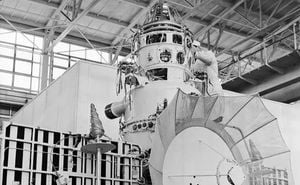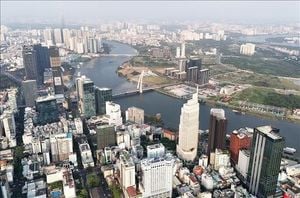President Donald Trump and Taiwan Semiconductor Manufacturing Company (TSMC) Chairman and CEO C.C. Wei announced today, March 3, 2025, the expansion of TSMC's advanced semiconductor operations in Arizona, marking the largest foreign direct investment in U.S. history at $100 billion. This monumental commitment not only adds to TSMC’s existing $65 billion investment but also cements Arizona as the epicenter of advanced chip manufacturing.
At the White House press event, attended by both Trump and Wei, the details of this significant investment were revealed. TSMC plans to build three new semiconductor fabrication plants, two advanced packaging facilities, and research and development centers, which collectively support the production of cutting-edge chips. This expansion will lead to the creation of over 40,000 construction jobs within the next four years and tens of thousands of high-tech employment opportunities.
“TSMC’s historic announcement cements Arizona as the epicenter of advanced chip manufacturing and innovation in America,” remarked Arizona Governor Katie Hobbs. “With the country’s most advanced chip-making processes, world-class university partners, and a strong talent pipeline, Arizona is powering groundbreaking technologies such as AI.”
Since confirming its first Arizona fab back in May 2020, TSMC has rapidly grown its presence. Following the recent announcement, their total investment has now surged to approximately $165 billion, representing around 9,000 new jobs, bringing the current employment at their Arizona facility to over 3,000 people.
Trump emphasized the need for domestic production of semiconductors, stating, “Semiconductors are the backbone of the 21st-century economy; without semiconductors, there is no economy. They power everything from AI to automobiles.” The investment is part of the U.S. government's strategy to lessen dependence on foreign supply chains and reinforce national security through local manufacturing.
TSMC has recently made strides in advanced semiconductor production, with its facility now producing 4-nanometer chips for U.S. customers. TSMC’s expansion will also include manufacturing for the world’s most advanced 2-nanometer process technology expected to begin production by the end of the decade. The company's investments reflect its commitment to cater to America's leading AI and technology firms, including Apple, NVIDIA, AMD, Broadcom, and Qualcomm.
“Earlier this month, we met with TSMC’s representatives to discuss future job creation, focusing on tapping our veteran workforce,” said Abe Hamadeh, whose congressional district encompasses TSMC. “They are clearly committed to President Trump’s America First Manufacturing agenda, creating high-paying employment options for our community.”
The ramifications of this investment extend beyond employment; it is projected to generate more than $200 billion of indirect economic output across Arizona and the United States over the next decade. TSMC's expansive project highlights how public and private sectors can engage effectively to create substantial economic opportunities.
Mark Kelly, Arizona Senator and lead negotiator of the CHIPS and Science Act, emphasized bipartisan commitments and cooperation from local, state, and federal leaders as being foundational to making Arizona one of the best locations for such advanced manufacturing facilities. “Boosting domestic microchip development reduces reliance on foreign supply chains and ensures America leads the way for future industries,” Kelly stated.
TSMC's expansion is also seen as pivotal due to geopolitical factors, especially tensions with China. By diversifying its manufacturing footprint away from Taiwan, TSMC aims to mitigate potential risks associated with political instability and natural disasters typical of the region.
“This is big news for Arizona,” said Mayor Kate Gallego. “It shows how TSMC is not only bolstering domestic manufacturing but also enhancing national security.” TSMC's facility on 1,100 acres of land officially began high-volume production of its first fab at the end of 2024, solidifying its role as a leader in the industry.
The compatibility of this investment with recent U.S. policies, such as the CHIPS and Science Act, which allotted significant federal funding for domestic semiconductor development, underlines the federal government's commitment to revitalize American manufacturing. The U.S. Commerce Department and Natcast, operators of the National Semiconductor Technology Center, announced Arizona as the site for their advanced packaging facilities, signaling more forthcoming opportunities for growth and innovation.
“TSMC’s investment not only assures job stability for thousands but also creates opportunities for skilled labor throughout our region,” stated Sandra Watson, President and CEO of the Arizona Commerce Authority. “Smart policy leads to significant investment, and today’s announcement reinforces Arizona as a national leader in semiconductor manufacturing.”
Industry voices echo similar sentiments, recognizing TSMC's efforts as beneficial for all stakeholders involved, especially for the local workforce. Chris Camacho from the Greater Phoenix Economic Council emphasized the region's burgeoning semiconductor ecosystem, now more competitive and innovative than ever thanks to TSMC's initial and expanded investment.
This announcement stands as yet another reason Arizona is establishing itself as the go-to destination for chip production, and as TSMC continues to expand, the state is poised to lead the way for the semiconductor industry, tapping its full potential to reclaim manufacturing dominance.
While TSMC continues to expand its footprint, its future relationships with major tech clients including Apple are poised for growth. Apple plans to invest more than $500 billion over the next several years backed by TSMC's operations, ensuring long-term partnerships and collaboration.
The effects of these investments stand to redefine not just Arizona’s economic future, but also the entire American economy as it aims for self-sufficiency in technology and manufacturing capabilities.
Moving forward, TSMC’s bold expansion strategy could reshape the competitive dynamics within the semiconductor industry, allowing the U.S. to establish itself as not only a consumer of technology but as one of its primary creators. The next decade promises significant developments, technological innovations, and strategic partnerships—all arising from this landmark investment.



